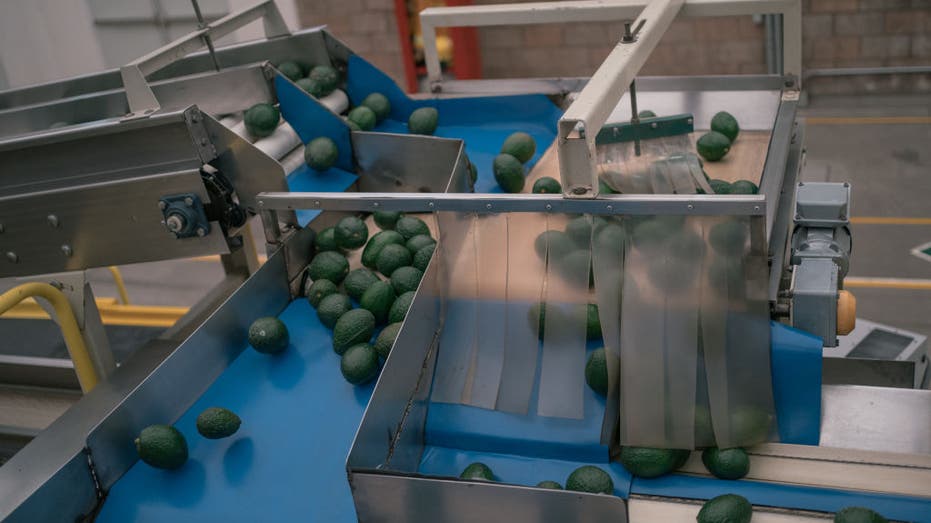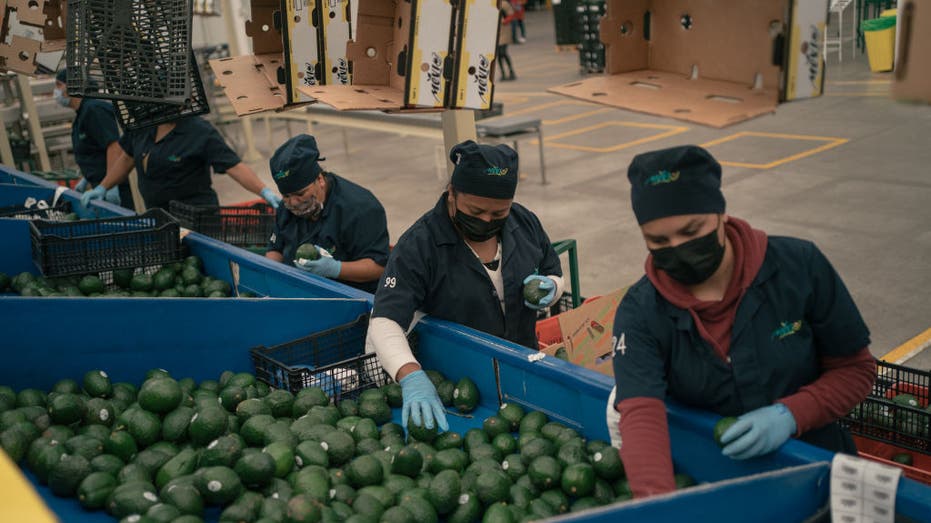USDA approves the export of Jalisco Mexican avocados to US
Avocado exports from the Jalisco region to the United States will begin immediately
The Mexican avocado industry is celebrating the addition of the Jalisco region to the United States market following a certification from the USDA's Animal and Plant Health Inspection Service (APHIS).
The certification provides U.S. avocado buyers with a second region in Mexico to source product, previously U.S. stores only had avocados from the Michoacán region.

A worker selects avocados at a packing plant in Uruapan, Michoacan state, Mexico. (AP Photo/Armando Solis, File / AP Newsroom)
For 25 years, the Michoacán region was the only region with access to the U.S. market.
A new region might help with prices, which have soared this year to over $2 per fruit amid a dip in production in Michoacán.
Growers and packers in Jalisco, just northwest of Michoacan, expressed hope that their state can provide more consistent production levels and stability for prices for avocados, which have fluctuated widely amid seasonal supply shortages.
"When we were talking about very high prices a month ago, it was because the market wasn’t getting enough supply," said Javier Medina Villanueva, president of the Jalisco Avocado Export Association. "So we believe that the entry of Jalisco will close that supply shortage. … I think prices will stabilize."
Eleven trucks bearing nearly 20 tons of avocados from Jalisco lined up Thursday in the mountain town of Zapotlan El Grande to set out for the United States.
AIRLINE TRADE GROUP REQUESTS MEETING WITH FAA TO DISCUSS AIR TRAFFIC CONTROLLER STAFFING CHALLENGES
Consumers in the United States won’t immediately recognize the difference: Jalisco avocados won’t bear any special tag, and will be labeled as "avocados from Mexico" — a phrase promoted for years by producers in Michoacan.
The head of the Michoacan-based Association of Mexican Avocado Growers and Packers, Jose Luis Gallardo, said he doesn’t see Jalisco, or any of the other Mexican states now clamoring for U.S. export certification, as competition.
"Today is a day of joy for everyone, knowing that Jalisco is here, but it is going to be happier when the State of Mexico comes, when Nayarit, Colima, Puebla, Morelos come," Gallardo said of the other states, noting there was room for more exports; last season’s production in Michoacan was down by about 200,000 tons.

Avocados move along a conveyor at a packing facility in Ciudad Guzman, Jalisco state, Mexico. (Luis Antonio Rojas/Bloomberg via Getty Images / Getty Images)
Mexico currently supplies about 92% of U.S. imports of the fruit, and Mexico’s agriculture department says it is working to get more states certified. About a half dozen states grow significant quantities of avocados, which prefer higher altitudes and cooler climates in Mexico.
Medina Villanueva noted that meeting U.S. sanitary requirements wasn’t easy. "It took 10 years," he said. "It took patience."
The United States is strict about such imports in order to protect U.S. avocado growers from damaging pests and diseases. Domestic U.S. production is complemented by imports because the Mexican harvest is January through March, while U.S. production runs from April to September.
The inspections were halted in February for about 10 days after one of the U.S. inspectors was threatened in Michoacán, where growers are routinely subject to extortion by drug cartels. Some packers in Michoacán were reportedly buying avocados from other, noncertified states and trying to pass them off as being from Michoacán and were angry the U.S. inspector wouldn’t go along with the scheme.
INFLATION TIMELINE: MAPPING THE BIDEN ADMIN'S RESPONSE TO RAPID PRICE GROWTH
Exports resumed after Mexico and the United States agreed "to enact the measures that ensure the safety" of the inspectors.
Francisco Trujillo, the head of Mexico’s plant and animal safety agency, noted that the Michoacán export ban should be a lesson for Jalisco producers.
"Caution should be part of this day of festivity," Trujillo said, noting that avocados certified for export were worth four or five times as much as those destined for domestic markets, creating "temptations" to pass off noncertified fruit. "We could run the risk that this festive day becomes a tragedy" if the U.S. were to ban exports again, he said.
Jalisco Gov. Enrique Alfaro acknowledged that his state will have to avoid problems that have plagued the reputation of avocados in Michoacán, where some growers have cut down native pine forests to plant avocado trees and dried up local water supplies to irrigate them. Drug cartels have also extorted protection payments from avocado growers and packers.
Alfaro said Jalisco has plans "to develop a security program … so that this product can be produced in the orchards, be shipped through Jalisco and reach its final destination safely."
Alfaro also said he would push to certify Jalisco avocados as free from deforestation, something Michoacán has been slow to do.
"The idea of pushing a plan to certify avocados as free from deforestation shouldn’t just be an issue for some growers. We want to establish that as an obligation for the good of the whole industry," Alfaro said.

Workers pack avocados at a facility in Ciudad Guzman, Jalisco state, Mexico. (Luis Antonio Rojas/Bloomberg via Getty Images / Getty Images)
At this point, Jalisco has only about 20,000 acres (8,420 hectares) of avocado orchards certified as pest free, a small amount compared to over nearly 300,000 acres (120,000 hectares) in Michoacán. But Alfaro said another 65,000 acres (26,000 hectares) in Jalisco were in line to be certified.
But it is unclear whether exporting more avocados would hurt Mexican consumers, many of whom have been unable to afford their traditional guacamole — and the avocado slices that accompany many foods in Mexico — after domestic prices reached almost $3 per pound in recent weeks.
CLICK HERE TO READ MORE ON FOX BUSINESS
Recipes for pseudo-guacamole, made largely with green tomatoes or zucchini, have been circulating on social media sites in Mexico amid the price spike. Together with higher costs for limes, that has contributed to increased prices for tacos at street stands.
The Associated Press contributed to this report.





















